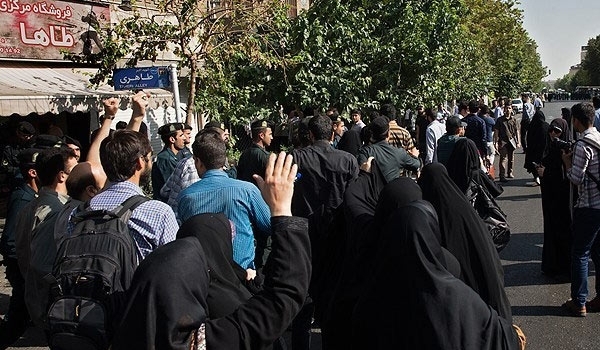Iranian MPs, University Formations Protest at British Embassy Reopening

“The foreign ministry should have made a statement before the reopening of the British embassy and should have told people the cause of the reopening,” Secretary of the University of Tehran Students’ Islamic Society Reza Nazari told FNA on Sunday.
“Has Britain promised to avoid meddling in Iran’s internal affairs? The old cunning fox should promise not to incite sedition in Iran again,” he added.
Also, senior Iranian legislator Seyed Amir Hossein Qazizadeh Hashemi said that the government is required to abide by the parliament approvals and laws on the reopening of embassies and the British embassy reopening is no exception.
“History has shown that Britain has always wanted to spy on Iran and incite sedition and today, we have the same assessment and prediction and Britain is unlikely to be in pursuit of any other goal other than spying and mischief,” he told FNA today.
Many in Iran are angry at the embassy reopening as British Foreign Secretary Philip Hammond arrived in Tehran and reopened his country’s mission.
In relevant remarks on Saturday, several Iranian university students formations, political figures and elites slammed the reopening of the British Embassy in Tehran, saying that London’s black track record in Iran displays how dangerous the resumption of ties with Britain is.
The Office for Consolidating Unity in a statement voiced its opposition to the reopening of the British Embassy, and said, “The British embassy’s record shows nothing but support for spying operations, organization of street unrests and assassination of Iranian scientists.”
It noted that Britain has on several occasions proven its animosity towards the Iranian nation, and the reopening of the embassy would pave the way for London’s spying on Iran.
Meantime, Secretary of the University Students Justice-Seeking Movement said that Britain’s attitude towards Iran has worsened after the closure of its embassy in Iran. “Reopening the British embassy in Iran would be a counterrevolutionary, illegal and irrational move,” Hossein Shahbazi said.
Shahbazi pointed to Britain’s past behavior in Iran, and said, “The parliament’s ratified law says that the British Embassy should not be reopened unless Britain changes its behavior.”
Relations between Iran and Britain hit an all-time low in November 2011, when the two countries shut down their diplomatic missions around Britain’s key role in the imposition of a new set of western sanctions against Iran and its repeated meddling with Iran’s domestic affairs.
Iran recalled all its staff and closed its embassy in London in November after Britain recalled its diplomatic mission in Tehran due to massive protests in front of the British embassy complex by thousands of Iranian students who demanded a cut of ties with London.
The Iranian students’ November protests at the British mission came after the Iranian legislators in an open session of the parliament in November approved the bill of a law on downgrading relations with Britain. After the parliament approval, Iran expelled the British ambassador from Tehran.
The parliament approval came a week after the US and Britain targeted Iranian financial sectors with new punitive measures, including sanctions on Iran’s Central Bank and petrochemical industry.
The sanction against CBI and Iran’s petrochemical industry was adopted in a unilateral move by the US, Canada and Britain outside the UN Security Council as other council members, specially Russia and China, had earlier warned against any fresh punitive measure, including sanctions, against Iran.
The British government has also embarked on delisting the anti-Iran terrorist Mojahedin-e Khalq Organization (MKO) from its list of terrorist groups.
The Iranian lawmakers initially started drafting a bill to downgrade ties with London after Britain’s direct involvement in stirring post-election unrests in Iran in 2009, but they intensified and accelerated the move after former British Envoy to Tehran Simon Gass criticized the human rights situation in Iran.
“Today, International Human Rights Day is highlighting the cases of those people around the world who stand up for the rights of others – the lawyers, journalists and NGO workers who place themselves at risk to defend their countrymen,” Gass said in a memo published by the British Embassy in Tehran on December 9, 2010.
“Nowhere are they under greater threat than in Iran. Since last year human rights defenders have been harassed and imprisoned,” Gass added.
Following Britain’s support for a group of wild demonstrators who disrespected Islamic sanctities and damaged private and public amenities and properties in Tehran on
On December 27, 2009, members of the parliament’s National Security and Foreign Policy Commission drafted bill of a law requiring the country’s Foreign Ministry to cut relations with Britain completely.
The British government’s blatant stance and repeated remarks in support of the last year unrests inside Iran and London’s espionage operations and financial and media support for the opposition groups are among the reasons mentioned in the bill for cutting ties with Britain.
Iran has repeatedly accused the West of stoking post-election unrests, singling out Britain and the US for meddling. Tehran expelled two British diplomats and arrested a number of local staffs of the British embassy in Tehran after documents and evidence substantiated London’s interfering role in stirring post-election riots in Iran.
But after President Rouhani rose to power, he and his foreign minister, Mohammad Javad Zarif, pursued the policy of detente and started talks with London on the resumption of diplomatic ties and reopening embassies.
In a meeting at the UN Headquarters in New York City on September 23, Iranian Foreign Minister Mohammad Javad Zarif and his British counterpart William Hague discussed improvement of Tehran-London relations, Iran’s nuclear energy program as well as regional developments.
In October, Iran and Britain agreed to announce the names of their non-resident charges d’affaires.
Last December, Head of Iran-Britain Parliamentary Friendship Group Abbasali Mansouri Arani underlined that the British member of the House of Commons, Jack Straw, was due to visit Iran to pave the way for the normalization of ties between the two states.
Straw visited Iran the same month.







